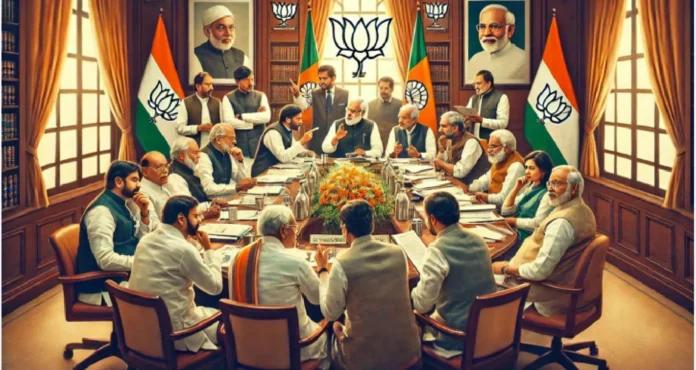By India Legal Bureau
Now that the dust has settled on the Delhi elections, attention has shifted to the next big question—who will captain the capital? The BJP, fresh off a sweeping victory, has an array of contenders vying for the top job. However, if past trends are anything to go by, the final pick is likely to be a surprise.
Secrecy and unpredictability define Prime Minister Narendra Modi’s approach when selecting chief ministers. Until the official announcement is made, only two people truly know the decision—Modi and Union Minister Amit Shah. BJP President JP Nadda may be in the loop, but, as insiders suggest, his role is largely nominal.
Modi’s Playbook: Surprise and Strategy
The BJP’s track record in appointing chief ministers suggests that lobbying is not a winning strategy. In 2017, Yogi Adityanath, fresh from an intense campaign, was denied permission to travel abroad. Unaware of what lay ahead, he soon found himself helming Uttar Pradesh. Similarly, in Gujarat, Bhupendra Patel was plucked from relative obscurity while planting saplings in Ahmedabad. His name left even party insiders asking: Who Patel? Which Patel? Why Patel?
The recent appointments—Bhajan Lal Sharma in Rajasthan, Mohan Yadav in Madhya Pradesh, and Vishnu Deo Sai in Chhattisgarh—further reinforce Modi’s preference for unexpected choices.
At present, two states await Modi’s decision: strife-torn Manipur and politically stable Delhi. In Manipur, Chief Minister Biren Singh’s resignation had sparked speculation about President’s Rule, as the centre navigates the demands of warring ethnic groups—primarily the Kukis and Meiteis. Now President’s Rule has been imposed in the state and the assembly is under suspended animation. Unlike Manipur, Delhi offers the BJP a free hand in choosing its leadership.
Delhi’s Political Landscape: The Stakes Are High
The BJP’s return to power in Delhi after 27 years is historic. The party comfortably crossed the halfway mark in the 70-member assembly, securing 48 seats, while the AAP won only 22. The Congress, for the third consecutive time, failed to open its account.
The last time the BJP ruled Delhi (1993-1998), it saw three chief ministers:
- Madan Lal Khurana, who stepped down after 27 months due to corruption allegations.
- Sahib Singh Verma, removed after 31 months for failing to control onion prices.
- Sushma Swaraj, Delhi’s first woman chief minister, serving only 52 days.
Interestingly, both Khurana’s and Verma’s sons—Harish Khurana and Parvesh Verma—won their respective seats in the recent elections. Meanwhile, Swaraj’s daughter, Bansuri Swaraj, is an MP from New Delhi and played an active role in the BJP’s campaign.
With legacy and fresh leadership in the mix, both Parvesh Verma and Bansuri Swaraj are emerging as strong contenders for the chief minister’s chair.
Contenders and The Politics of Representation
Verma’s victory over Arvind Kejriwal has earned him the “giant slayer” tag, while Swaraj is seen as young, articulate, and an appealing choice for a party looking to project a fresh face. At 41, she has already made her mark in national politics. However, Verma’s political career has seen setbacks—he was denied a Lok Sabha ticket in 2024 and would not have been in the chief ministerial race if not for his high-profile win against Kejriwal.
Beyond individual merits, gender, caste, and regional considerations will likely shape the BJP’s decision. The party may choose a woman chief minister to consolidate its appeal among women voters, especially after Modi’s pro-women schemes played a crucial role in securing votes. If that happens, Bansuri Swaraj could be a strong choice, making her Delhi’s fourth woman chief minister after Sushma Swaraj, Sheila Dikshit, and Atishi.
Another possibility is appointing a Sikh leader to strengthen BJP’s ties with the Sikh and Punjabi communities, who played a key role in its Delhi victory. Given the wounds of the 1984 anti-Sikh riots and the community’s historical distrust of the Congress, this move could have deep political significance.
The Purvanchali factor is also in play. The BJP won 11 of the 14 seats dominated by Purvanchali voters, a crucial demographic given the upcoming Bihar elections. Modi himself, in his victory speech, acknowledged their role in BJP’s success.
Dalit representation is another consideration. This election marked the first time the BJP gained substantial Dalit support at the assembly level, winning four of the 12 reserved seats.
A Moment of Reckoning For The BJP
With a decisive mandate in Delhi, the BJP faces a fundamental question:
- Should it focus on identity politics—gender, caste, and regional representation?
- Should it indulge in political tokenism despite having a comfortable majority?
- Or should it prioritize governance and choose a leader committed to development?
The AAP government’s initiatives—such as mohalla clinics and school upgrades—resonated with the public. Instead of dismantling these programmes purely for political reasons, the BJP would be wise to build upon them and deliver tangible improvements. Delhi needs governance, not grandstanding.
The BJP has been given a historic mandate. The time for action is now. The choice it makes will shape not just Delhi’s future, but also the party’s long-term strategy on the national stage.


